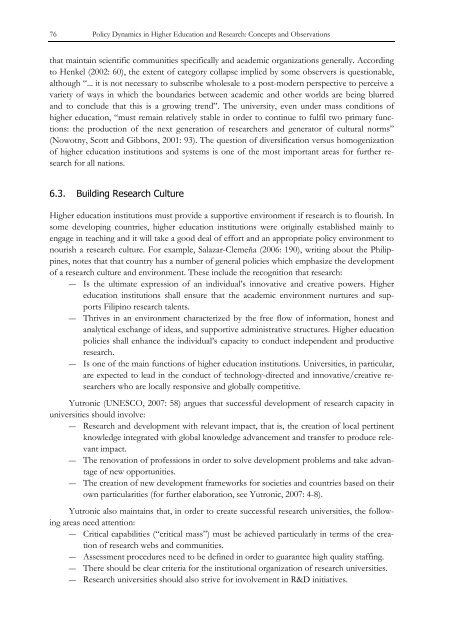Higher education, research and innovation ... - unesdoc - Unesco
Higher education, research and innovation ... - unesdoc - Unesco
Higher education, research and innovation ... - unesdoc - Unesco
Create successful ePaper yourself
Turn your PDF publications into a flip-book with our unique Google optimized e-Paper software.
76 Policy Dynamics in <strong>Higher</strong> Education <strong>and</strong> Research: Concepts <strong>and</strong> Observations<br />
that maintain scientific communities specifically <strong>and</strong> academic organizations generally. According<br />
to Henkel (2002: 60), the extent of category collapse implied by some observers is questionable,<br />
although “... it is not necessary to subscribe wholesale to a post-modern perspective to perceive a<br />
variety of ways in which the boundaries between academic <strong>and</strong> other worlds are being blurred<br />
<strong>and</strong> to conclude that this is a growing trend”. The university, even under mass conditions of<br />
higher <strong>education</strong>, “must remain relatively stable in order to continue to fulfil two primary functions:<br />
the production of the next generation of <strong>research</strong>ers <strong>and</strong> generator of cultural norms”<br />
(Nowotny, Scott <strong>and</strong> Gibbons, 2001: 93). The question of diversification versus homogenization<br />
of higher <strong>education</strong> institutions <strong>and</strong> systems is one of the most important areas for further <strong>research</strong><br />
for all nations.<br />
6.3. Building Research Culture<br />
<strong>Higher</strong> <strong>education</strong> institutions must provide a supportive environment if <strong>research</strong> is to flourish. In<br />
some developing countries, higher <strong>education</strong> institutions were originally established mainly to<br />
engage in teaching <strong>and</strong> it will take a good deal of effort <strong>and</strong> an appropriate policy environment to<br />
nourish a <strong>research</strong> culture. For example, Salazar-Clemeña (2006: 190), writing about the Philippines,<br />
notes that that country has a number of general policies which emphasize the development<br />
of a <strong>research</strong> culture <strong>and</strong> environment. These include the recognition that <strong>research</strong>:<br />
― Is the ultimate expression of an individual’s innovative <strong>and</strong> creative powers. <strong>Higher</strong><br />
<strong>education</strong> institutions shall ensure that the academic environment nurtures <strong>and</strong> supports<br />
Filipino <strong>research</strong> talents.<br />
― Thrives in an environment characterized by the free flow of information, honest <strong>and</strong><br />
analytical exchange of ideas, <strong>and</strong> supportive administrative structures. <strong>Higher</strong> <strong>education</strong><br />
policies shall enhance the individual’s capacity to conduct independent <strong>and</strong> productive<br />
<strong>research</strong>.<br />
― Is one of the main functions of higher <strong>education</strong> institutions. Universities, in particular,<br />
are expected to lead in the conduct of technology-directed <strong>and</strong> innovative/creative <strong>research</strong>ers<br />
who are locally responsive <strong>and</strong> globally competitive.<br />
Yutronic (UNESCO, 2007: 58) argues that successful development of <strong>research</strong> capacity in<br />
universities should involve:<br />
― Research <strong>and</strong> development with relevant impact, that is, the creation of local pertinent<br />
knowledge integrated with global knowledge advancement <strong>and</strong> transfer to produce relevant<br />
impact.<br />
― The renovation of professions in order to solve development problems <strong>and</strong> take advantage<br />
of new opportunities.<br />
― The creation of new development frameworks for societies <strong>and</strong> countries based on their<br />
own particularities (for further elaboration, see Yutronic, 2007: 4-8).<br />
Yutronic also maintains that, in order to create successful <strong>research</strong> universities, the following<br />
areas need attention:<br />
― Critical capabilities (“critical mass”) must be achieved particularly in terms of the creation<br />
of <strong>research</strong> webs <strong>and</strong> communities.<br />
― Assessment procedures need to be defined in order to guarantee high quality staffing.<br />
― There should be clear criteria for the institutional organization of <strong>research</strong> universities.<br />
― Research universities should also strive for involvement in R&D initiatives.

















